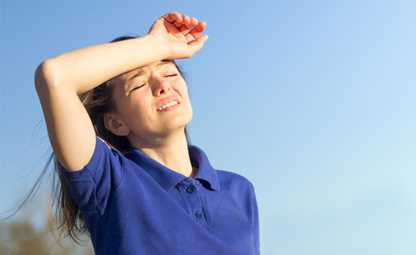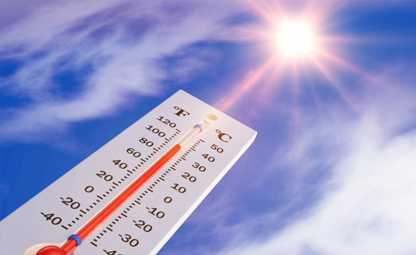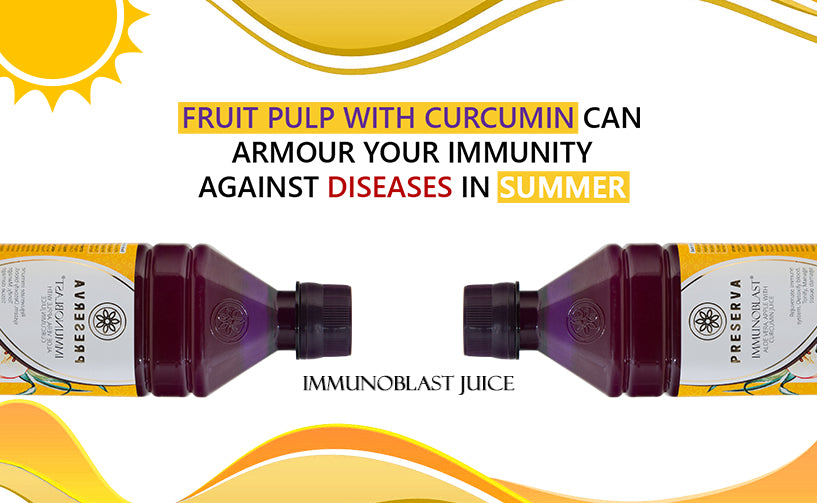With the ongoing climate change, temperature has reached over 45 degree Celsius in many areas in India including Delhi. Though summer comes every year, this year has been an additional difficulty with the intolerable rise in temperature associated with typically hot wind blowing over. Temperature over 42 degree Celsius accompanied with dry wind results in heat wave. During the day, it has become extremely difficult to step out of houses and offices. Those who do the field work prefer to work under a tree when sun is at its peak these days. Life has become truly difficult to operate in this scorching heat. Not only the blowing hot air dehydrates you every five minutes, it increases the chances of other diseases as well.
Heat-related illness develops in your body when body’s normal temperature control system is unable to effectively regulate its internal temperature. Due to body’s regulatory system, the body cools itself through evaporation of sweat at high temperatures under normal conditions. But when humidity is high with temperature, the cooling mechanism of body becomes less effective. Since sweat does not evaporate quickly, the body is prevented from releasing heat. If fluid intake is also less than adequate, dehydration occurs due to excessive fluid losses and electrolyte imbalances. This leads to rise in a person’s body temperature and very high temperature can lead to damage of brain and other vital organs. Conditions such as old age, obesity, fever, dehydration, heart disease, poor circulation, sunburn, and drug or alcohol use limit the body’s ability to regulate body temperature. There are certain groups of people, who are at the greatest risk of heat-related illness such as infants and children up to 4 years of age, people who are 65 years or older in age, people who overexert during outdoor work or exercise, people with mental illness, and people who are chronically ill or are on certain medications.
Following symptoms can develop due to heat-related illness:
-
Heat rash : Red bumps on the skin and a feeling of prickly or itchy sensation on skin after exposure to hot temperature symbolize heat rash.

- Fainting due to heat or Heat syncope : It includes symptoms such as dizziness or light-headedness and fainting, generally due to prolonged exposure to heat, dehydration, low blood pressure on standing from a sitting posture or orthostatic hypotension.
- Heat cramps : There is significant sweating with involuntary spasms of muscles in the body. Heat cramps most often affect the legs.
- Heat exhaustion : Due to heat exhaustion, a person may develop nausea, vomiting, headache, weakness, muscular cramps, weakness and profuse sweating.
- Heat oedema : Swelling in the legs and hands can occur after sitting or standing for a long time in a hot environment.
- Heat tetany : It is a sign consisting of involuntary contraction of muscles caused by short periods of stresses in hot environment.
- Heat stroke : This is an emergency condition. A person experiences nausea, severe muscle cramps and aches, nausea, vomiting, fatigue, headache, weakness, confusion and even coma.
All people desire to be prevented from the harmful effects of heat wave. Many people do not have air conditioning at all places they visit during the day. Those who have air conditioning at homes and offices also need to make following efforts to remain safe during heat wave:
-
Fans have their own importance :
Use box fans or ceiling fans to allow the air circulation throughout your home and office. An exhaust fan should be there in areas where more heat is present such as kitchen. In evening, you can open all doors and windows of your home to allow the air to circulate. As the sun rises, close all curtains, doors and windows to keep the indoors cooler than the outside temperature.
-
Use water :
Water the plants outside your home and maintain an adequate water intake. Wet towels can have cooling effect. You can try it. People in rural areas use this trick to keep themselves cool. They step out with wet towel or bandanna wrapped around them.
-
Use the ground floor to live :
If you have a multi storey building, use the ground floor to spend your most time of the day as the upper stories of the home are warmer than the ground floor. This is because hot air rises above the ground level.
-
Remove the extra sources which generate heat :
Switch off the computers when not in use as they generate a lot of heat. Minimise the use of incandescent light bulbs. Eat freshly prepared food so that extra heat is not generated as you do not need to re-heat it.
-
Keep distance from alcohol and too much caffeine :
Both these substances are diuretic in nature and can cause dehydration.
-
Consume Immunoblast Juice :
It helps you get adequate oral curcumin supplementation in form of a pure Ayurvedic herbal product. It is formulated by Preserva Wellness and gives you the benefit of pulp of apple, aloevera and mulberry. These ingredients improve the fighting power of your body and reduce the chances of inflammatory responses against heat. The bacteria, virus and fungi which invade specifically in hot weather also get a tough fight inside your body when you consume Immunoblast Juice by Preserva Wellness.
-
Do not eat heavy meal :
Avoid eating large portions. Divide them into smaller portion and keep a gap of at least two hours in consuming them. Eating a lot of food at once can be really bad for your body during heat.
-
Make your tea time as curcumin tea time :
Another Ayurvedic herbal product which can give you oral curcumin supplementation is Immune Boosting Tea by Preserva Wellness, which is a blend of curcumin with hibiscus, moringa, Tulsi, lemongrass, Ashwagandha, Rose petals and black pepper. This curcumin tea does not generate heat unlike a normal turmeric tea. You can consume it in a chilled form. Immune Boosting Tea keeps you protected from heat wave as its ingredients together help your body’s control system to keep normal temperature. Also, it gives plenty of nutritional advantages which keep your body fit in extremes of temperature.






